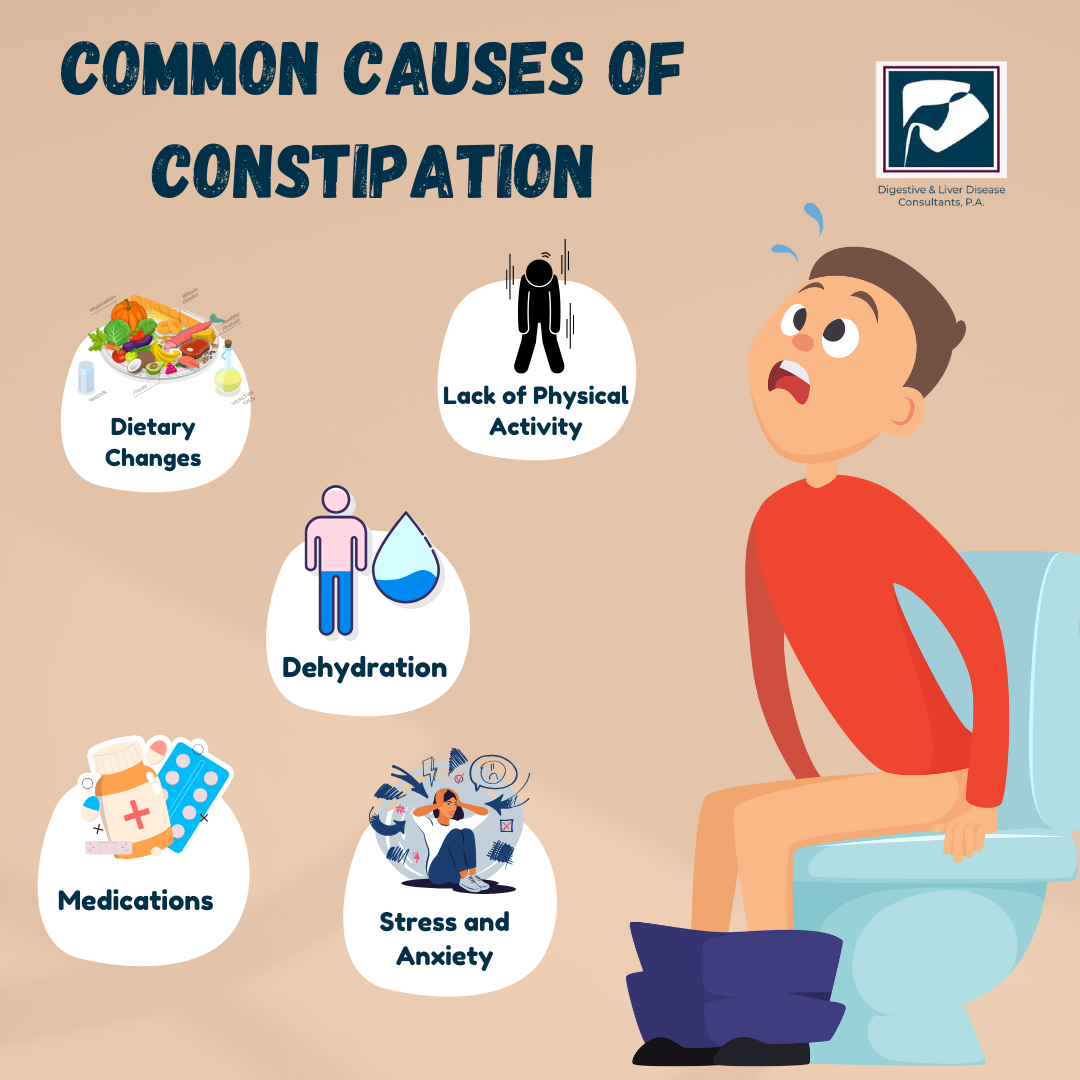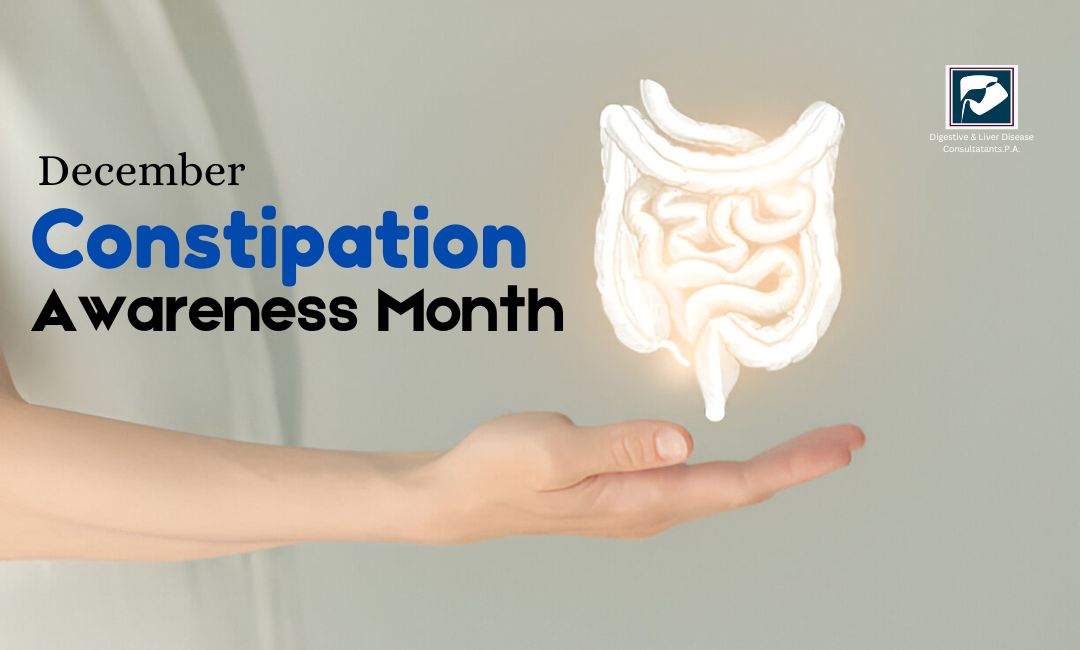December is not only the month for holiday festivities but also Constipation Awareness Month, a time dedicated to educating people about this common but often overlooked health issue. For many, the busy holiday season can bring stress, altered routines, and dietary changes that might contribute to constipation. However, understanding what constipation is, what causes it, and how to prevent it can make a big difference in maintaining digestive health.
What is Constipation?
Constipation refers to infrequent, difficult, or painful bowel movements. It can also involve feeling like you haven’t completely emptied your bowels. While occasional constipation is common for most people, persistent or chronic constipation can lead to discomfort, distress, and other health problems.
Common Causes of Constipation
Several factors can contribute to constipation, some of which might surprise you. Here are the most common causes:

Dietary Changes: A lack of fiber in the diet is a leading cause of constipation. Foods rich in fiber, such as fruits, vegetables, and whole grains, help keep the digestive system moving smoothly. During the holiday season, many people indulge in foods that are low in fiber, like cookies, cakes, and other festive treats, which can slow down digestion and lead to constipation.
Dehydration: Water plays an essential role in digestion. Without enough fluids, the stool can become hard and difficult to pass. Many people drink less water during colder months, and sugary beverages or caffeinated drinks might not help hydrate the body as effectively.
Lack of Physical Activity: Exercise helps stimulate normal bowel function. When we sit for long periods, especially while traveling or lounging during the holidays, bowel movements can become sluggish.
Medications: Certain medications, including painkillers, antacids, and antidepressants, can cause constipation as a side effect. If you are taking any medication and notice a change in your bowel movements, be sure to talk to your doctor.
Stress and Anxiety: The holiday season can be a stressful time for many people. Stress can negatively affect your gut, leading to digestive issues like constipation. Additionally, changes in routine and eating habits can contribute to bowel irregularity.
Underlying Medical Conditions: Some medical conditions like irritable bowel syndrome (IBS), hypothyroidism, or neurological disorders can also cause constipation. If you suffer from any of these conditions, you may be more prone to constipation.
The Complications of Untreated Constipation
While occasional constipation is common and usually resolves on its own, persistent constipation can lead to several complications that may affect your health. Some of these complications include:
Hemorrhoids: Straining during bowel movements can put pressure on the veins in the rectal area, leading to swollen, painful hemorrhoids.
Fecal Impaction: Severe constipation can lead to the accumulation of hardened stool in the rectum, making it difficult or impossible to pass stool without medical intervention.
Rectal Prolapse: Chronic straining can cause the rectum to protrude from the anus, which is known as rectal prolapse. This condition requires medical treatment to correct.
Digestive Discomfort: Ongoing constipation can lead to bloating, abdominal pain, and discomfort, making it difficult to go about your daily routine.
Decreased Quality of Life: Constipation can affect your overall well-being, leading to frustration, embarrassment, and a reduced quality of life. It can also interfere with work and social activities, making it important to address.
Tips to Prevent Constipation
The good news is that constipation can often be prevented or managed with some simple lifestyle changes. Here are a few tips to help you keep your digestive system working smoothly:
Increase Fiber Intake: Fiber is your best friend when it comes to promoting regular bowel movements. Foods like leafy greens, whole grains, beans, and fruits like apples and berries are high in fiber and help move food through the digestive tract.
Drink Plenty of Water: Staying hydrated is key to preventing constipation. Aim to drink at least 8 glasses of water a day. If you’re consuming caffeinated or alcoholic beverages, be sure to drink extra water to counteract their dehydrating effects.
Stay Active: Regular physical activity helps stimulate digestion and keeps the bowel moving. Aim for at least 30 minutes of moderate exercise a day. A walk after meals can also aid digestion and prevent constipation.
Establish a Regular Routine: Try to go to the bathroom at the same time each day. Don’t ignore the urge to go, as this can make constipation worse. Listening to your body’s natural signals is important for maintaining healthy bowel habits.
Avoid Overuse of Laxatives: While laxatives can provide temporary relief from constipation, they can also lead to dependency if used too frequently. Focus on natural methods, such as increasing fiber intake and hydration, for long-term digestive health.
Manage Stress: Stress can affect your digestive system, so it’s important to practice stress-management techniques, such as yoga, meditation, or deep-breathing exercises, especially during the busy holiday season.
Monitor Medications: If you’re taking medications that might contribute to constipation, talk to your doctor. There may be alternative treatments or adjustments that can help prevent constipation.
When to See a Doctor
If you’re dealing with chronic constipation or if it’s interfering with your daily life, it may be time to seek medical advice. Severe constipation, especially if accompanied by symptoms like blood in the stool, extreme abdominal pain, or unexplained weight loss, requires prompt attention. A healthcare provider can help identify the underlying cause and recommend appropriate treatments.
At Digestive & Liver Disease Consultants P.A. (DLDC), we understand how constipation can affect your health and well-being. If you’re struggling with constipation or need guidance on how to improve your digestive health, don’t hesitate to contact us. Our team is here to provide personalized care and help you feel your best.
Conclusion
Constipation is a common issue that many people face, but it doesn’t have to be a regular part of your life. By making simple changes to your diet, lifestyle, and routine, you can reduce your risk of constipation and enjoy better digestive health. If you experience ongoing constipation or discomfort, remember that help is available. During Constipation Awareness Month, take the opportunity to prioritize your health, and reach out to a doctor if needed.
Take control of your health today, and don’t let constipation interfere with your life. Reach out to Digestive & Liver Disease Consultants P.A. for guidance and care that you can trust.






